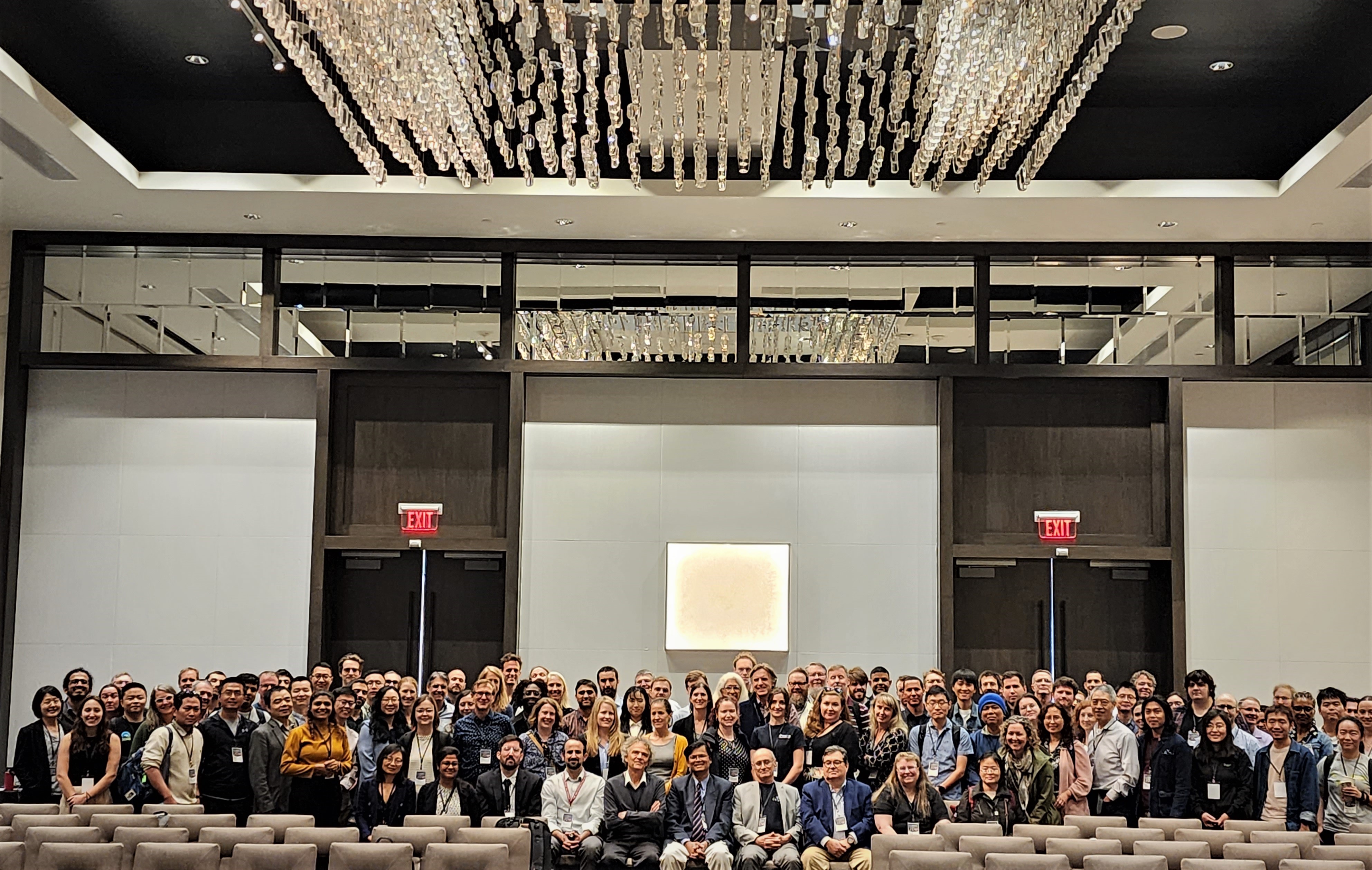
NASA’s Carbon Cycle & Ecosystems (CC&E) focus area hosted the Joint Science Workshop (JSW) on May 8-12, 2023 at The Hotel in College Park, MD.
The first two days (May 8-9) were LCLUC meeting with an emphasis on the early career scientists’ projects. Next two days were joint meeting with other NASA Earth Science programs of the Carbon Cycle and Ecosystems Focus Area at plenary sessions .
NASA’s CC&E focus area is an umbrella under which four program elements (Land-Cover and Land-Use Change, Ocean Biology and Biogeochemistry, Terrestrial Ecology, and Biological Diversity) provide knowledge of the interactions of global biogeochemical cycles and terrestrial and aquatic ecosystems with global environmental change and the implications for Earth's climate, productivity, and natural resources. This event aimed to combine input from community members across the CC&E programs and their Applied Sciences counterpart, the Ecological Forecasting program.
JSW Plenary talks addressed five themes:
- Future Research Directions
- Human Influence on Global Ecosystems
- Climate Change Impacts
- Research to Applications
- Disturbance, Resilience, Mitigation, & Adaptation.
Dates:
May 8-12, 2023 (Monday-Friday)
Individual program team meetings were held on Monday, Tuesday, and Friday, with the Joint Science Workshop general sessions occurred on Wednesday and Thursday. View the at-a-glance agenda here.
Who can attend:
Principal investigators, co-investigators, collaborators, stakeholders, and students funded through NASA's Carbon Cycle and Ecosystems focus area programs are welcome to attend, as well as those from the Ecological Forecasting program and Marine Biodiversity Observation Network (MBON). Meeting registration will open closer to the meeting dates; however, NASA Civil Servants and Contractors may register in NCTS now (#45747-23). JPL employees should register using the UFO conference travel website.
Logistics:
The Hotel at the University of Maryland, College Park, MD
Hotel reservation information is available on our logistics page.
The last Joint Science Workshop was held in 2015, with 550 attendees and nearly 250 posters. You can take a look at the 2015 meeting website here.
Questions?
Please contact support@cce.nasa.gov.
Meeting Presentations
DAY 1 (Monday, May 8th 2023)
Program Presentations
Welcome Address and Objectives of the LCLUC Hotspot Initiative – Chris Justice (UMD) ChrisJustice_Day1_ST2023
LCLUC Program Update - Garik Gutman (NASA HQ) GarikGutman_Day1_ST2023
MuSLI session: Hotspots results (LCLUC-2020)
Forest
Quantifying Agricultural Expansion and Tropical Forest Degradation in the Brazilian Arc of Deforestation: A Multi-Sensor, Multi-Scale Approach - Michael Keller (US Forest Service) MichaelKeller_Day1_ST2023
Multi-Resolution Quantification and Driver Assessment of Hot Spots of Global Forest Disturbance - Alexandra Tyukavina (University of Maryland, College Park) AlexandraTyukavina_Day1_ST2023
Sensor Fusion Using Daily Planet Imagery Allows Rapid Deforestation Monitoring in Madagascar - Sean Healey (Forest Service) SeanHealey_Day1_ST2023
Agriculture
High-Impact Hot Spots of Land Cover Land Use Change: Ukraine and Neighboring Countries - Sergii Skakun (University of Maryland, College Park) SergiiSkakun_Day1_ST2023
Making the Hidden Visible: Accelerated Land-Use Change and Degradation Caused by Narco-Trafficking in and Around Central America’s Protected Areas - Nicholas Magliocca (University of Alabama, Tuscaloosa) NickMagliocca_Day1_ST2023
The Impact of Investment on Irrigated Rice, Dryland Agriculture and Afforestation in Senegal Using SAR and Optical Time-Series Imagery in Data Fusion Approaches - Christopher Neigh (NASA Goddard Space Flight Center) ChristopherNeigh_Day1_ST2023
Fire
Where are the Missing Burned Areas? Global Hotspots of Burned Area - A Multiresolution Analysis - David Roy (Michigan State University) DavidRoy_Day1_ST2023
Global Hotspots of the Wildland-Urban Interface - Volker Radeloff (University of Wisconsin, Madison) VolkerRadeloff_Day1_ST2023
Multi-Source Wildland Urban Interface Characterization Enhanced with Machine Learning: Dynamics and Hazard Assessment - Yufang Jin (University of California, Davis) YufangJin_Day1_ST2023
Savanna
Hotspot Detection for Monitoring New Trends in Carbon Sequestration in Systems of Trees Outside of Forests (TOF) - David Skole (Michigan State University) DavidSkole_Day1_ST2023
Urban
The Last Urban Frontier: Assessing Drivers of Urbanization and Tradeoffs Among Social and Ecosystem Services Associated with LCLUC in Africa - Jody Vogeler (Colorado State University) JodyVogeler_Day1_ST2023
Extractive Industry
Rapid Change from Alluvial Mining and Development in Madre de Dios, Peru: A Multi-Sensor Fusion Approach to Quantify Terrestrial and Aquatic Impacts and Test Policy Effectiveness - David Lutz (Dartmouth College) DavidLutz_Day1_ST2023\
Wetlands
Global Hotspots of Change in Mangrove Forests - Marc Simard (Jet Propulsion Laboratory) MarcSimard_Day1_ST2023
Summary and discussion: MuSLI Hotspots – Krishna Vadrevu (NASA MSFC)
DAY 2 (Tuesday, May 9th 2023)
Early Career Scientists session: Hotspots results (LCLUC-2021)
Savanna
Untangling the Interactions Between Rural Outmigration, Grassland Degradation, and Sustainable Land Use in Mongolia - Qiongyu Huang (Smithsonian Institution) QiongynHuang_Day2_ST2023
Forest
A Remote Sensing Analysis of Heat Stress, LCLUC, and Women’s Health in Sub-Saharan Africa - Nina Brooks (University of Connecticut, Storrs) NinaBrooks_Day2_ST2023
Land Cover Change, Conflict, and Peacebuilding in Colombia - McKenzie Johnson (University of Illinois, Urbana-Champaign) BinPeng_Day2_ST2023
Urban
Columbia A Multi-Faceted, PanMediterranean Assessment of Urban Land Change for the Evaluation of Interconnected Climate Risks - Eleanor Stokes (Universities Space Research Association) EleanorStokes_Day2_ST2023
Assessing the Impact of Urban Land Conversion on Local and Regional Surface Climate and Its Socioeconomic Consequences in Western North Africa - Alexey Shiklomanov (Goddard Space Flight Center) AlexeyShiklomanov_Day2_ST2023
Extractive Industry / Mining
Analyzing the Land-Use Change Impacts of Oil and Gas Exploration Related Infrastructure Changes on Arctic Communities - Latha Baskaran (Jet Propulsion Laboratory) LathaBaskaran_Day2_ST2023
Agriculture
Water Scarcity in the Serbian Danube: Agricultural Land Use Change and Irrigation - Sean Woznicki (Grand Valley State University) SeanWoznicki_Day2_ST2023
Fire
Early Estimation of Fire-Risk in the Eastern Mediterranean and Socioeconomic Informed Communications of Actionable Strategies - Nimrod Carmon (Jet Propulsion Laboratory) NimrodCarmon_Day2_ST2023
Discussion: Hotspots research in Early Career Scientist projects – Krishna Vadrevu (NASA MSFC), Moderator
Closing Remarks
Future Directions for LCLUC program: Open Discussion – Chris Justice (UMD) ChrisJustice_Day2_ST2023
Wrap up and next steps: Garik Gutman (NASA HQ) GarikGutman_Day2_ST2023